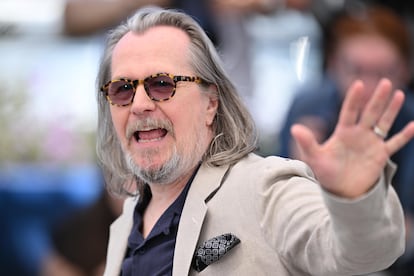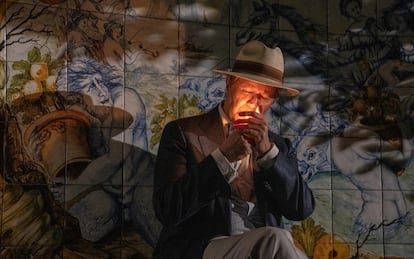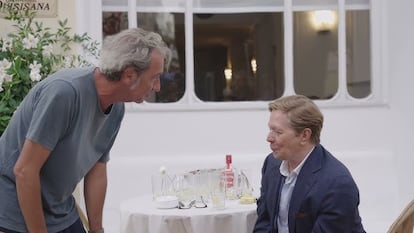On the terrace of the hotel where he attends to the press, Gary Oldman (London, 67 years old) speaks while fighting against the hair that invades his face. The wind does not stop; English doesn’t seem to care much. In fact, a feeling reigns in the actor’s placid expression: nothing bothers him, time is frozen, there is no rush, there is only room for enjoyment and calm talk. Before a group of journalists accelerated in the presentation of Parthenopeby Paolo Sorrentino (which opens in Spain on Christmas Day), in which Oldman plays John Cheever, the Londoner decides that it is time to open up and walk through his life, that of a man who has not drunk since 27 years ago. The actor breathes deeply, and leaves no room for many questions; there will only be answers.
Part of Oldman’s vital tranquility comes from his marriage (the British’s fifth), since 2017, with the photographer and art curator Gisele Schmidt. “We always travel together, Gigi (waves from a table a few meters away), my stepson (next to his mother), and me. And that has meant that I am going through the best moment of my best life. Traveling accompanied, with family, is wonderful,” he says at the Marriott hotel, at the Cannes festival, where the meeting is taking place. One of the actor’s first confessions comes: “This is coming from someone who has spent half his life living out of a suitcase, in hotels. Only. When you finished the day, you went to your hotel, ordered a disgusting dinner from room service and, as John Cheever wrote: ‘My trembling hand reaches for the phone to call Alcoholics Anonymous and then I reach for the last of the whiskey, the gin, the vermouth… I’ll call tomorrow.’ It took me a long time to get out of my head, meet someone and enjoy traveling and being happy. I know there are also people who don’t get it. I do. “I would be dead if I hadn’t stopped drinking.”
“I would be dead if I hadn’t stopped drinking.”
John Cheever is the last of the addicts, in the case of the writer to alcohol, given life to Oldman, a performer specialized in turbulent characters whom he ended up resembling for a long time. If for the multiplex audience, the Londoner is that actor who played the villain in blockbusters like Air Force One or that appeared in the saga Harry Potter and Christopher Nolan’s Batman (playing Commissioner Gordon), the movie buff will remember how at the end of the eighties, a pale boy exploded in the cinema indie english with Sid y Nancy y open your ears before landing in the US to chain The clan of the Irish, JFK: open case y Bram Stoker’s Dracula. Since then, he has dabbled in all types of industries (in Spain he starred shadow forest, by Koldo Serra) and budgets, won the Oscar for bringing Churchill to life in The darkest moment, caressed two other statuettes from the Hollywood Academy (for The mole y lack) y played with all types of accents: he has also monetized his voice in animated films and video games. By the way, his histrionics disappear in person, and his natural voice is much more of a whisper than the gush that emanates from the screen. Over the years he has abandoned sadistic characters, twisted psychopaths, for roles with a certain bonhomie.
Cheever is one of those, an author who has been shipwrecked by alcohol in the idyllic Naples that Sorrentino draws in Parthenope. Oldman feels that the right time has come: their experiences are similar, although the actor was saved: “Paolo told me that John Cheever was a melancholic, sad and drunk writer. I know what that is. It’s no secret that I used to drink and, in fact, I just celebrated 27 years of sobriety.” Oldman pauses, but it is clear that his answer is not finished: “Cheever was a tortured soul who suffered from a double life. He was married, with a family and had to hide his homosexuality because it was what was done at that time. All that guilt, shame and secrets drowned them in alcohol. You know the saying: ‘You are as sick as your secrets.’ Secrets eat you alive, just like when you doubt yourself or hate yourself. I understood the character instinctively, and created my own melancholic version of that stereotype of the lonely and alcoholic writer, Hemingway type, with creative block, who hides a creator who whispers in one ear and a critic in the other. I know all that well. I guess that’s what led him to alcohol, because it’s what led me to alcohol.”

Oldman emphasizes that, beyond the awards or popular applause, what saved him from self-destruction was his acceptance of how he was and his attendance at Alcoholics Anonymous meetings: “Sobriety can end in seconds. Acceptance has to come from yourself. As they say in the Alcoholics Anonymous book: ‘An acceptance was the answer to all my problems.’ And he starts laughing: “Be careful, the Oscar is good too. I walk past him from time to time.”
That understanding now allows him to give life, from his sobriety, to drunks like in Lackthis Parthenope one to the series Slow Horses. “The romanticization that fiction usually makes of alcoholism is not good. Of course, it exists and has always been that way. All my heroes as a child were drunks. And now look at me, I myself am going through my period of alcoholic characters… Do you know who has created the best drunk in cinema? Denzel Washington in The flight. “Denzel never disappoints,” he laughs.

The conversation never leaves self-contemplation. “Let’s see, it’s my story. I know there were periods when I could have been more creative. There were times when I preferred being drunk to doing anything else. But I’m not that guy anymore, the path continues. And maybe I had to go through all that to get here now.” In an interview for the series Slow Horses Months earlier, he explained: “It is very selfish to be an artist or actor. A vision absorbs you and you sacrifice many things. I like photography, I have many books to see, many movies to see, things I want to do. “I won’t stop being creative, I’ll just slow down everything else.” Do you really feel that way? “Of course, let’s enjoy.” And it points to a sparkling Mediterranean Sea that frames the panoramic terrace.
Little more. Oldman, the new shaman of self-acceptance, advises: “There is a very popular phrase that goes something like: ‘We have one foot in the past, one in the future, and we piss on the present.’ That is, we don’t enjoy the moment. And this is one of the themes of Parthenope, the feeling that devours the young characters. It is obvious that we cannot do anything about aging, so there is no point in opposing it. Therefore, today I am happier than ever, more comfortable in my own skin than when I was young.”

